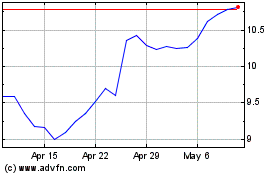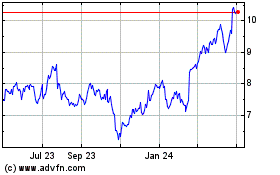Goldman Retreats From Options as Stock Derivatives Trading Struggles
November 03 2017 - 5:59AM
Dow Jones News
By Gunjan Banerji
Waning stock volatility is pressuring the equity derivatives
business, suppressing revenue and driving traders out of what was
once a key Wall Street moneymaker.
Revenue in an equity derivatives business that focuses on listed
options shrank by 41% in the U.S. and by 28% globally during the
first half of 2017 from the same period a year ago, according to
data firm Coalition, which tracked 12 of the biggest banks in the
world. The number of employees in equity derivatives at banks has
contracted by about 10% since 2012, Coalition data also show.
An extraordinary calm in markets has choked the trades that
typically funnel through banks' derivatives desks. Banks like
Deutsche Bank AG, Barclays Plc and J.P. Morgan Chase & Co.
blamed lower revenues on depressed volatility when recently
reporting earnings.
Goldman Sachs Group Inc. pulled back from U.S. options
market-making on exchanges, a spokeswoman for the firm said
Thursday. It's the latest to withdraw from the business of
continuously buying and selling contracts on venues using automated
programs.
The business isn't a large part of Goldman's overall equity
derivatives revenue and the decision to retreat was driven by the
high costs related to connecting to the many options exchanges,
among other market structure issues, said a person familiar with
the matter. The firm will still provide options services for
clients, the spokeswoman said.
The number of equity derivatives contracts that have traded
worldwide has dwindled since 2011, data from the World Federation
of Exchanges show, as central banks worldwide propped up markets,
damping investors' desire to use derivatives like options to hedge
or protect holdings. Derivatives also face competition from
quantitative trading, in which computers help develop
strategies.
"With lower volatility this year, we're seeing less of those
trades come through," said Coalition's research director Amrit
Shahani. "It's a vicious cycle."
OptionMetrics LLC founder David Hait said investors tend to
think of options as insurance for stock bets.
With U.S. equities in an eight-year bull market, people are
asking, "What do I need an option for?" he said.
The so-called flow equity derivatives business at banks can also
include over-the-counter derivatives and swaps. Traders help
research and execute trades using derivatives, while sales
employees contact clients, such as hedge funds and pension funds,
to suggest moves, collecting commissions when the trades are
done.
The situation looks more dire for some banks. In the first half
of 2017, revenue from Barclays's U.S. equity derivatives flow
trading slumped to less than half of the $200 million it brought in
the same period last year, according to a person with knowledge of
the matter. Banks rarely break out this business from their
equities broadly. Barclays declined to comment on the drop in
revenue.
Analysts pressed Barclays in an October earnings call on why the
firm underperformed peers in stocks. Chief Executive Jes Staley
acknowledged that the bank was "surprised" by the decline in their
flow equity derivatives business. A main area of underperformance
in equities was in derivatives, said Barclays Group Finance
Director Tushar Morzaria.
The decline was largely driven by its exposure to individual
stocks, said the person familiar with the matter. Options bets on
specific companies have been one of the hardest hit areas, as
investors gravitate toward passive investments and algorithmic
strategies. Trading individual U.S. stock options has fallen
steadily since 2006 and is near its record low of 49% of total U.S.
options volume, according to Tabb Group research through the third
quarter.
Bright spots include trading on ETFs and indexes, which
dominated U.S. options activity last quarter, Tabb data show.
Structured products -- investment packages put together by banks
that often include derivatives -- were also lucrative for some
firms.
Equity derivatives account for a tiny slice of the derivatives
held by U.S. banks, which held $2.9 trillion in notional amount as
of the second quarter, compared with over $185 trillion across
derivatives on assets including interest-rate products, data from
the Office of the Comptroller of the Currency show.
After 16 years of trading options during which he ascended to
managing director at Bank of America Corp. and Deutsche Bank, Zahid
Biviji left Wall Street this year.
He cited fewer opportunities in the space, partly caused by
regulations imposed after the financial crisis. He founded Wapanda,
a phone app that will connect riders with taxis and ride-sharing
services like Lyft.
"I had a good run making money," Mr. Biviji said, noting that "a
lot of the derivatives business is in survival mode right now."
Some traders have pivoted to a less-regulated asset:
cryptocurrencies.
"For the most part, you're not going to get wealthy like you
could in the late '90s or early 2000s" in equity derivatives, said
Arthur Hayes, the Hong Kong-based co-founder and chief of Bitcoin
Mercantile Exchange, who traded derivatives at Citigroup Inc. and
Deutsche Bank. "In cryptos, you actually get to do what you like to
do: trade."
Write to Gunjan Banerji at Gunjan.Banerji@wsj.com
(END) Dow Jones Newswires
November 03, 2017 05:44 ET (09:44 GMT)
Copyright (c) 2017 Dow Jones & Company, Inc.
Barclays (NYSE:BCS)
Historical Stock Chart
From Mar 2024 to Apr 2024

Barclays (NYSE:BCS)
Historical Stock Chart
From Apr 2023 to Apr 2024
